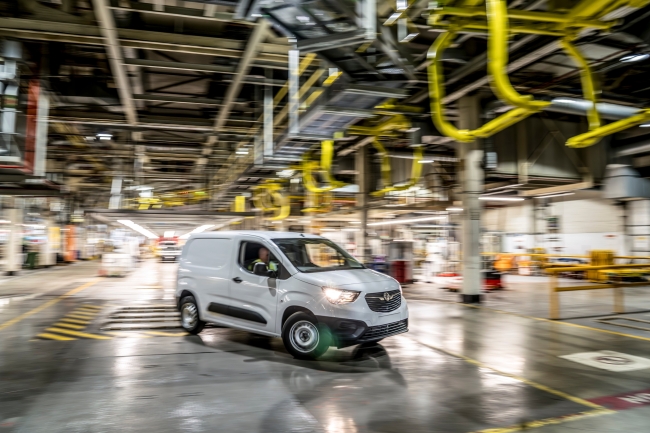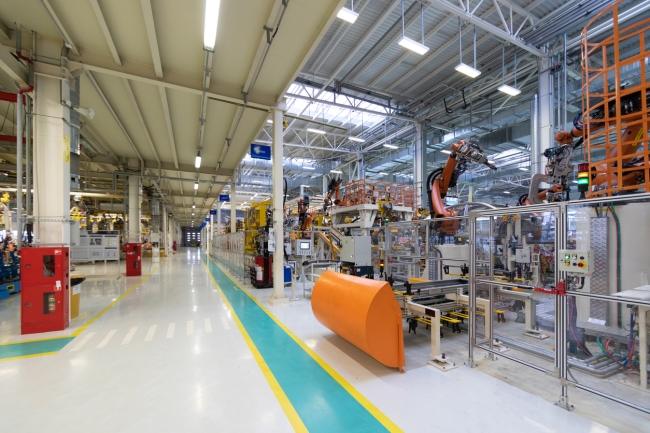3 minute read - 27th December 2023
Car and commercial vehicle production growth up again
British car and commercial vehicle manufacturing both saw production growth again in November, according to new figures from the Society of Motor Manufacturers and Traders (SMMT). Car production rose 14.8% in November and commercial vehicle manufacturing saw its best November for units produced since 2007, growing 16.8% compared to last year.
Car makers saw 91,923 cars roll out of factory gates, an increase of 11,832 on November last year, representing the best performance for the month since 2020, as supply chain challenges continue to improve.
Production for both the home and overseas markets increased, up 13.4% and 15.2% respectively. Some 22,919 cars stayed in the UK, though, as always, exports drove volumes. Export growth was driven mainly by the EU, China and Turkey, although Europe received by far the bulk (60.8%) of all shipments, reinforcing the need for tariff-free electrified vehicle trade across the Channel. Shipments to these markets rose by 22.4%, 37.3% and 208.8% respectively, offsetting a -21.6% fall in cars heading to the US.

British car production rose for the ninth consecutive month in November, whilst commercial vehicle output saw the best performance since 2007, according to the latest SMMT figures / Picture: Stellantis
Never miss the latest manufacturing news by signing up to our newsletter here
UK production of battery electric (BEV), plug-in hybrid (PHEV) and hybrid (HEV) vehicles continued its upward trajectory, with combined volumes up 20.0% to 35,169 in November and representing 38.3% of total manufacturing output. Since January, UK car factories have turned out a record 322,577 of these vehicles, up 53.7% on the same period in 2022, pushing overall production volumes up 119,499 units on 2022, to 843,345 units – already 68,331 units ahead of full year 2022 with December’s figures still to come.
Mike Hawes, SMMT chief executive, said: “UK car production is firmly back on track following the tough Covid years and resulting supply chain challenges. With significant investment committed to UK automotive manufacturing, production volumes increasing and the imminent threat of tariffs on EVs traded with the EU now removed by the extension of current rules of origin until 2027, there is renewed confidence in the sector. We now need to see the Anglo-European battery industry build capacity at pace to meet forecast demand.”
Commercial vehicle factories produced 13,253 vans, buses, trucks, coaches and taxis, up 16.8% and representing the ninth month that has seen growth in 2023.
The November total is 51.1% up on 2019’s pre-pandemic level with output responding to demand from export markets, up 18.3% to 9,451 units with 71.3% of output shipped abroad. The EU again retained its status as the most important overseas market for UK CV exports, taking 96.3% of all vehicles leaving Britain. Orders for UK buyers, meanwhile, also rose, by 13.4% to 3,802 units.

13,253 commercial vehicles were produced in November, with British car factories manufacturing 91,923 cars / Picture: Getty/iStock
As a result, British CV production year-to-date is up 15.5% to 111,863 units, the best for the January-November period since 2010, in part due to new production facilities coming on stream and the ability of manufacturers to put supply chain challenges behind them. Strong demand from overseas markets means exports are up 21.0% to 71,679 units, while production for domestic buyers has risen by a more modest 6.8% to 40,184 units, pushing overall production more than 10,000 units up on full year 2022 with December’s figures still to come.
Mike Hawes, added: “UK CV production is on track to record its best year in more than a decade, testament to the competitiveness of automotive manufacturing in this country. Fresh investment to make the latest, zero emission vans here has helped boost volumes of vehicles that are increasingly in demand from fleet operators across Europe. The industry can look forward with renewed optimism, especially with a deal to extend the current EU-UK trade rules for EVs and batteries now agreed.”
